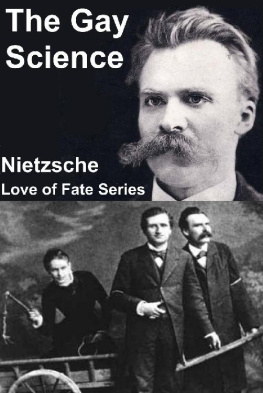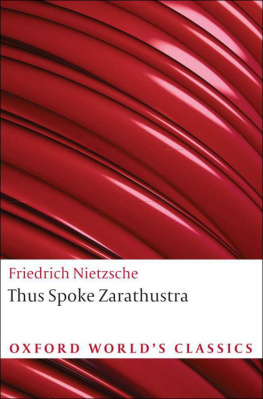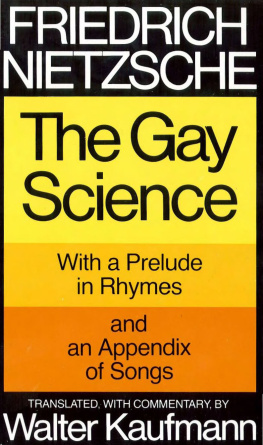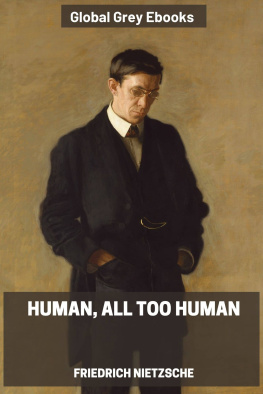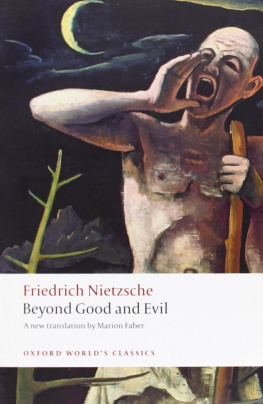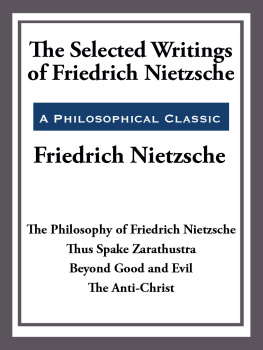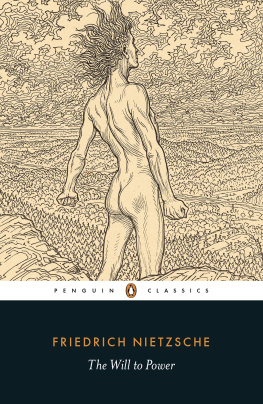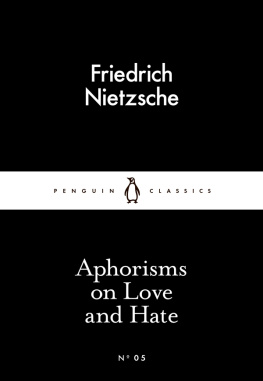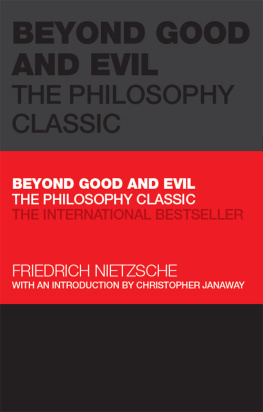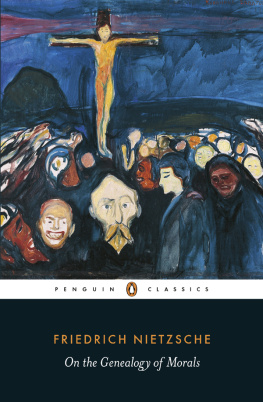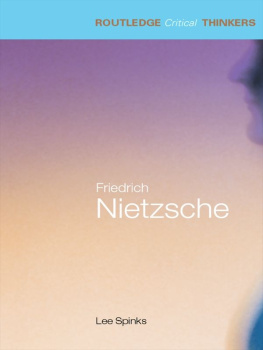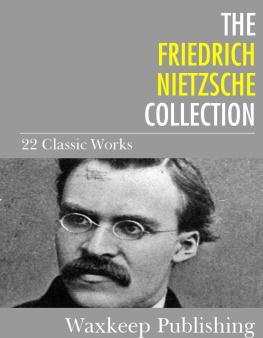Friedrich Nietzsche - Beyond Good and Evil (Penguin Classics)
Here you can read online Friedrich Nietzsche - Beyond Good and Evil (Penguin Classics) full text of the book (entire story) in english for free. Download pdf and epub, get meaning, cover and reviews about this ebook. year: 2003, publisher: Penguin Books, genre: Science. Description of the work, (preface) as well as reviews are available. Best literature library LitArk.com created for fans of good reading and offers a wide selection of genres:
Romance novel
Science fiction
Adventure
Detective
Science
History
Home and family
Prose
Art
Politics
Computer
Non-fiction
Religion
Business
Children
Humor
Choose a favorite category and find really read worthwhile books. Enjoy immersion in the world of imagination, feel the emotions of the characters or learn something new for yourself, make an fascinating discovery.

- Book:Beyond Good and Evil (Penguin Classics)
- Author:
- Publisher:Penguin Books
- Genre:
- Year:2003
- Rating:5 / 5
- Favourites:Add to favourites
- Your mark:
- 100
- 1
- 2
- 3
- 4
- 5
Beyond Good and Evil (Penguin Classics): summary, description and annotation
We offer to read an annotation, description, summary or preface (depends on what the author of the book "Beyond Good and Evil (Penguin Classics)" wrote himself). If you haven't found the necessary information about the book — write in the comments, we will try to find it.
Beyond Good and Evil (Penguin Classics) — read online for free the complete book (whole text) full work
Below is the text of the book, divided by pages. System saving the place of the last page read, allows you to conveniently read the book "Beyond Good and Evil (Penguin Classics)" online for free, without having to search again every time where you left off. Put a bookmark, and you can go to the page where you finished reading at any time.
Font size:
Interval:
Bookmark:

FRIEDRICH NIETZSCHE was born near Leipzig in 1844, the son of a Lutheran clergyman. He attended the famous Pforta School, then went to university at Bonn and at Leipzig, where he studied philology and read Schopenhauer. When he was only twenty-four he was appointed to the chair of classical philology at Basle University; he stayed there until his health forced him into retirement in 1879. While at Basle he made and broke his friendship with Wagner, participated as an ambulance orderly in the Franco-Prussian War, and published The Birth of Tragedy (1872), Untimely Meditations (18736) and the first part of Human, All Too Human (1878; two supplements entitled Assorted Opinions and Maxims and The Wanderer and his Shadow followed in 1879 and 1880 respectively). From 1880 until his final collapse in 1889, except for brief interludes, he divorced himself from everyday life and, supported by his university pension, he lived mainly in France, Italy and Switzerland. The Dawn appeared in 1881 followed by The Gay Science in the autumn of 1882. Thus Spoke Zarathustra was written between 1883 and 1885, and his last completed books were Ecce Homo, an autobiography, and Nietzsche contra Wagner. He became insane in 1889 and remained in a condition of mental and physical paralysis until his death in 1900.
R. J. HOLLINGDALE translated eleven of Nietzsche's books and published two books about him; he also translated works by, among others, Schopenhauer, Goethe, E. T. A. Hoffman, Lichtenberg and Theodor Fontane, many of these for Penguin Classics. He was the honorary president of the British Nietzsche Society. R. J. Hollingdale died in 2001. In its obituary The Times described him as Britain's foremost postwar Nietzsche specialist and the Guardian paid tribute to his inspired gift for German translation. Richard Gott wrote that he brought fresh generations through fluent and intelligent translation to read and relish Nietzsche's inestimable thought.
Professor Richard Schacht, Executive Director of the North American Nietzsche Society, said that Hollingdale and Walter Kaufmann, his sometime collaborator, deserve much of the credit for Nietzsche's rehabilitation during the third quarter of the twentieth century. It is hard to imagine what Nietzsche's fate in the English-speaking world would have been without them. All of us in Nietzsche studies today are in Hollingdale's debt.
MICHAEL TANNER was educated in the RAF and at Cambridge University, where he was a Lecturer in Philosophy until 1997 and is a Fellow of Corpus Christi College. He is equally interested in philosophy, music and literature, his particular areas being Friedrich Nietzsche and Richard Wagner. He has written for many journals, contributed The Total Work of Art to The Wagner Companion, and is the author of Nietzsche (1995) and Wagner (1996).
PENGUIN BOOKS
Published by the Penguin Group
Penguin Books Ltd, 80 Strand, London, WC2R 0RL, England
Penguin Putnam Inc., 375 Hudson Street, New York, New York 10014, USA
Penguin Books Australia Ltd, 250 Camberwell Road, Camberwell, Victoria 3124, Australia
Penguin Books Canada Ltd, 10 Alcorn Avenue, Toronto, Ontario, Canada M4V 3B2
Penguin Books India (P) Ltd, 11 Community Centre, Panchsheel Park, New Delhi 110 017, India
Penguin Books (NZ) Ltd, Cnr Rosedale and Airborne Roads, Albany, Auckland, New Zealand
Penguin Books (South Africa) (Pty) Ltd, 24 Sturdee Avenue, Rosebank 2196, South Africa
Penguin Books Ltd, Registered Offices: 80 Strand, London, WC2R 0RL, England
www.penguin.com
This translation first published 1973
Reprinted with revisions and a new introduction 1990
Reprinted with new further reading and chronology, 2003
Translation, translator's note and commentary copyright R. J. Hollingdale, 1973, 1990
Introduction copyright Michael Tanner, 1990
All rights reserved
Except in the United States of America, this book is sold subject to the condition that it shall not, by way of trade or otherwise, be lent, re-sold, hired out, or otherwise circulated without the publisher's prior consent in any form of binding or cover other than that in which it is published and without a similar condition including this condition being imposed on the subsequent purchaser
978-0-141-90263-0
Beyond Good and Evil is one of the greatest books by a very great thinker, and like all such books it is very difficult, all the more so for not seeming to be. It was the first book that Nietzsche wrote after what he considered to be his masterpiece, Thus Spoke Zarathustra. That had been for him a great creative effort, and he never wavered in his view that it contained all the most important things he had to say. Perhaps it was, none the less, a suspicion that he had not been so entirely successful in it as he had hoped that led him to claim that all the books he wrote subsequently, at least up to Twilight of the Idols (1888), were commentaries on or expansions of it. When he sent the great historian Jacob Burckhardt a copy of Beyond Good and Evil (henceforth BGE) he wrote in the accompanying letter: Please read this book (although it says the same things as my Zarathustra, but differently, very differently). If he hadn't said so, one would hardly have guessed it; and though he did say so, I'm inclined to disagree. Nietzsche was always obsessed with there being a pattern to his life and works, and it is entirely characteristic of him that his last completed work, the wonderfully bizarre so-called autobiography Ecce Homo, should have been devoted to establishing what that pattern was, mainly through tracing the course of his literary productivity in the most tendentious way. But since he was also obsessed with teasing his readers, I rather feel that, both in the letter to Burckhardt and in Ecce Homo, Nietzsche was poking fun, and am inclined to resist his claim about BGE.
The most obvious difference between Thus Spoke Zarathustra and BGE is that in the former we have a narrative, though a tenuous one, that Zarathustra communicates through parables, exemplary encounters with a wide variety of people and even animals, and through sermons addressed to mankind but often insisting on the necessity of man's being replaced by the Superman. In BGE, by contrast, Nietzsche is very much concerned with addressing his contemporaries, in his favourite role of an untimely man, telling them things about themselves that he is sure they would rather not hear. There is not a single good-natured word in the entire book, he says in the chapter devoted to BGE in Ecce Homo, wilfully forgetting considerable tracts of it that express as powerfully as anything he ever wrote his tormented love for mankind. He also stresses in Ecce Homo that, while Zarathustra had been his great work of affirmation, after it he had to do what he had often sworn that he wouldn't: namely, say No as emphatically as possible. On 1 January 1882 he had taken a set of New Year's resolutions, and had recorded them at the beginning of Part Four of The Gay Science: I do not want to wage war against what is ugly, I do not want to accuse; I do not even want to accuse those who accuse. Looking away shall be my only negation. And all in all and on the whole: some day I wish only to be a Yes-sayer. That day never came in fact receded further and further as he went on writing for a nonexistent public. From now on, he writes of
Font size:
Interval:
Bookmark:
Similar books «Beyond Good and Evil (Penguin Classics)»
Look at similar books to Beyond Good and Evil (Penguin Classics). We have selected literature similar in name and meaning in the hope of providing readers with more options to find new, interesting, not yet read works.
Discussion, reviews of the book Beyond Good and Evil (Penguin Classics) and just readers' own opinions. Leave your comments, write what you think about the work, its meaning or the main characters. Specify what exactly you liked and what you didn't like, and why you think so.

